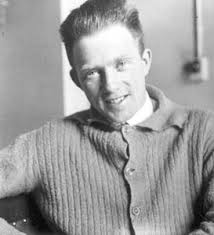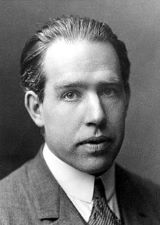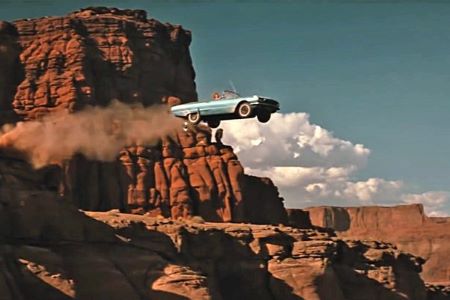Heisenberg Agonistes: Progress
Life in the 21st Century is a reader-supported publication. Please become a paid subscriber.

Long ago, I quit reading philosophy – credit or blame Nietzsche. Immediately after, I read a number of the 20th century physicists who were immensely educational and enjoyable. In ways, it was philosophy of a different sort. Many of the best had extensive knowledge of the Greeks, the intellectual roots, all agreed, fundamental to physics itself. Recently, I reread a few of these essential thinkers, instigated by the recent popular promotion/shilling of Artificial Intelligence (AI), the latest generation of computer technology, a technology itself developed with knowledge gained from 20th century physics.
The preceding generation of computing was defined by the networking of computers, most especially the internet. I became aware of the internet three decades ago, just as home and business desktop computers started to connect. Simultaneously, I had removed myself from the campaign election game, which continued spiraling down as quickly as the internet exploded up. However, my interest in politics, in the largest sense, didn't diminish. Most of the physicists I read, including Einstein, Bohr, Heisenberg, and Oppenheimer, all helped bring about the Quantum Era, insisted a healthy politics was not only necessary, but more essential than ever.
In the 90s, I spent a lot time thinking about, though entirely incapable of acting on the idea the internet could prove useful for, in fact its very implementation demanded, an American political renaissance, particularly, a reformation of democracy. Yet this turned out to be impossible for two important reasons. First, the increasingly debauched decline of traditional politics in America, and secondly, the culture of creating instant vast tech fortunes as the overwhelming measure of value in weighing the worth of any given technology. Americans love of technology is only surpassed by veneration for those who pile up quick fortunes, the greater the pile, the greater the adoration. Three decades later, our politics are even more dysfunctional, wealth as the determinant in decision making entirely unchecked and unbalanced.
So, in regards to AI, it's unsurprising to see our self-professed, self-deluding, apolitical tech oligarchy repeating the same nonpolitical arguments of the early 90s, such as “tech development can't be stopped.” Hell, it seemingly can't even be influenced. What's especially alarming, more accurately quite depressing, is the development of this next generation of compute technology is largely being led by the fortunes created by the internet, the last couple decades of “social media” wealth. You'd be hard pressed to prove the world is in anyway a better place because of Facebook, Twitter, Linkedin et al., but money was made, big money.
Unsurprisingly, the FT ran a piece by a pudgy, soft, extravagantly wealthy fellow named Reid Hoffman, who began his fortune with Paypal (boy what a sorry noxious lot that company has produced!) and then Linkedin. Now, he is shilling an AI play. He advises the rest of us,
“The answer to our challenges is not to slow down technology, but to accelerate it. Technology is a tool. And the faster we have it in our hands, the better we can solve the problems we have ― and the problems it might create.”
Phew! The more things change, the more they remain just as fucked-up. As advertised, AI is going to solve everything from climate change to finally finding Santa's workshop at the North Pole. I guess if you made billions of dollars on tech and had to deal with none of the consequences, you'd have unmitigated faith in technology and our technologists have a religious faith in technology's nirvana destiny, as zealous as the most faithful advocates of Buddha, Vishnu, Quetzalcoatl, or the Christ.
Now, there is another view, a view buried by the technologists and their lackeys. It is understanding gained from looking at the world after two centuries of technological development, that simply stepping on the gas isn't a solution for anything, unless I suppose you're Thelma and Louise, and well that's just a consciously directed last act, a full embrace of hopeless desperation as freedom. In direct opposition to this thinking is the thought of Werner Heisenberg, who at the age of 23 came up with the revolutionary quantum equations that gave us the bomb and the computer. With “complementarity”, Niels Bohr provided Heisenberg's equations with a traditional logic – talk about your philosophy!

As a good German of the era, Heisenberg was deeply classically educated. In a wonderful 1955 book titled The Physicist's Conception of Nature, he lays out the historical development of quantum physics from the Greeks to the 17th century scientific revolution that birthed the modern technological world. “Technology is a consequence of science in that a technical exploitation of the forces of nature is generally possible only on the basis of a close understanding of a particular field.”
He writes how our human-crafted world differs from the past,
“From the very start we have asked whether the changes in the foundations of modern science might not perhaps be considered as symptoms of shifts in the very basis of our existence, expressing themselves in various places simultaneously, be it in changes of our way of life, in external catastrophes, in wars or revolutions. If, starting from the condition of modern science, we try to find out where the bases have started to shift, we get the impression that if would not be too crude of an oversimplification to say that for the first time in the course of history modern man on this earth confronts himself alone.
Adding,
“The phrase: 'Modern man confronts himself alone' is assuming an ever greater validity in this age of technology. In previous times man felt that he confronted nature alone. Nature populated by creatures of all kinds was a domain existing according to its own laws, to which he had somehow to adapt himself. In our age, however, we live in a world which man has changed so completely that in every sphere―whether we deal with the tools of daily life, whether we eat food which has been prepared by machines, or whether we travel in a countryside radically changed by man―we are always meeting man-made creations, so that in a sense we meet only ourselves.”
Most importantly, in direct contrast to our billionaire tech evangelists, Heisenberg notes of our prominently technologically defined era, “Here, extensions of technology need not longer lead to progress.” Progress was the slogan of industrialism and now computing. It promotes uncritical development of any and all technologies, ignoring their impact on both the larger society and the greater environment.
Heisenberg defines the situation more complexly, the inherent paradox, the complementary aspects ingrained in all tech development, A simple Bohrian understanding looking at any object from one perspective never provides a whole picture. He offers an alternative way to think than the predominant simplistic tech boosterism:
“Hopes that the extension of man's material and spiritual powers would always spell progress are limited by this situation, if at first somewhat vaguely, the dangers increase as the optimistic wave of faith in progress dashes against this limitation. Perhaps we might illustrate this kind of danger by means of an analogy.
“In what appears to be its unlimited development of material powers, humanity finds itself in the position of a captain whose ship has been built so strongly of steel and iron that the magnetic needle of its compass no longer responds to anything but the iron structures of the ship; it no longer points north. The ship can no longer be steered to reach any goal, but will go around in circles, a victim of wind and currents. However, the danger persists only so long as the captain has not grasped that the compass is not responding to the magnetic forces of the the earth. The moment he realizes that the danger is as good as half-removed; the captain who does not wish to sail in circles but wishes to reach a known or even unknown goal will find ways and means of determining the direction his ship. He may use a modern compass which is not affected by the iron of the ship, or, as in the olden times, he may use the stars as his guides. Of course, he cannot order the stars to be visible at all times, and perhaps it is true that in our age only a few of them seem to be shining at all, but this one things is clear: the very realization that faith in progress must have a limitation involves the wish to cease going in circles and to reach a goal instead.”
An apt analogy for what would become the next 75 year development of the computer industry and the previously established Industrial Era. Our computer technologists encased inside the processor mistake it for a compass, with the larger world either ignored or looked at as just something to be manipulated. Unfortunately 75 years out, our tech captains haven't a clue they have no compass, this limitation, instead they call for, with mixed metaphor apologies, “the pedal to the metal,” a crew of Thelmas and Louises with no understanding of what lies just over the horizon they're accelerating into.

Heisenberg suggests two solutions. First, simply understand no one knows where we're going and the continual creation of technology in response to technology provides no direction. Defining technological progress in a world already defined by technology is circular motion, it is no progress at all. “As we become clearer about this limitation, the limitation itself might be considered to be the first foothold from which we may re-orientate ourselves.”
Secondly, Heisenberg suggests we must develop technology in relation to the greater world, the universe, not just ourselves. This includes an understanding of the past, the stars of “olden times”, though dimmed and some even lost can still help provide direction. An understanding of history, both humanity's own and the earth's natural history can help define goals, not just an endless circling of directionless technological development determined by the technology itself.
Heisenberg concludes,
“Perhaps this analogy will help us in gaining a new hope that although these limitations affect us in some ways, they do not limit life itself. The space in which man develops as a spiritual being has more dimensions than the single one which it has occupied during the last centuries. This would imply that over longer periods of time, a conscious acceptance of this limitation might well lead to some equilibrium, where man's knowledge and creative forces will once again find themselves ranged spontaneously about their common centre.”
A center that is not technology, but humanity, and as the Ancient Greek Aristotle long ago discerned, Homo sapiens is by nature a political animal, yet today our politics are broken. Creating a politics of technology will help revive and reform a healthy, vital politics, a politics necessary to help provide direction to technological development beyond the technology itself.
Today, we are further away from any such politics than we were thirty years ago or 75 years ago at the beginning of the Computer Age. Despite all the promotions of technologists, especially those assuring the empowering of the individual, the one political certainty, the one thing definitively proved over the last three-quarters of a century, the development of AI determined by the technology alone will lead to a greater concentration of wealth and power.

